Get posts by email
Our Journey (so far) with Dyslexia
August 17, 2012
Homeschooling an “easy reader” is a homeschooling mother’s dream. But what if your child struggles with reading? Well, I’ve been there and this is my story. And Laurent’s story, which I have permission to share. And it's a long one.
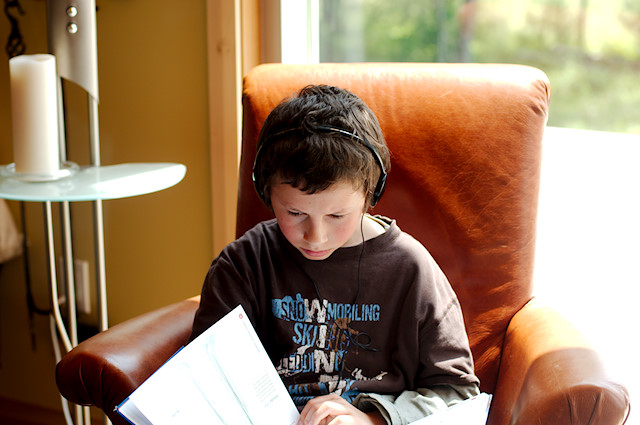
Before I tell our story I want to be clear about something. This is not a “how to diagnose your child for dyslexia” post. Nor does this post provide a long list of indispensable resources, inexpensive or otherwise, should your child also have dyslexia. Likewise, this post does not go into all the possible reading disabilities out there and how to differentiate dyslexia from the rest.
I will be sharing a few resources I’ve come across and what we’ve done so far to help Laurent. And my next post will be a review of a reading program we are currently using. Those resources are in no way the definitive answer for helping a dyslexic child. They are simply what we’re using, for our unique needs and situation.
How we Taught our Kids to Read (or tried)
It was almost two years ago when I posted our family’s approach to reading instruction. (The first post in this reading series is here.) You can read those posts if you want the thorough back story but I will recap it for you here.
Reading is a huge part of our life and books have always been central to our homeschooling. Reading, individually and together, is a part of who we are, what we do, and how we learn.
Céline was reading, with independence, ease and excellent comprehension at age six. She was our one and only to do this. A homeschooler’s dream.
We used the same methods to teach Laurent and Brienne as we used to teach Céline. Some people are comfortable teaching their children to read by simply reading with their child. I wasn’t. I wanted a program I could follow. Or rather my husband could follow, since he did the lessons. Teaching my children to read was my biggest fear about homeschooling. How ironic, considering how our story unfolds.
There are so many reading programs out there. I went with a trusted friend’s recommendation: Teach Your Child to Read in 100 Easy Lessons. And like I said, it worked fabulously for Céline. Another well recommended resource within the homeschooling community is The Ordinary Parent's Guide to Teaching Reading.
We started reading lessons for Laurent and Brienne at approximately the same time, ie: we grouped them them together. They do a lot of their academic type learning together as they are roughly at the same developmental stage. However, the lessons did not “work” for these two like they had for Céline.
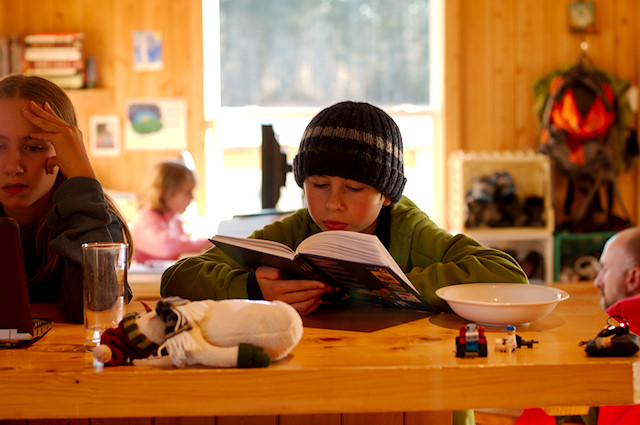
My kids have always loved books but the the skills they were “learning” in the lessons were not translating into actual independent reading. And they were tired of the lessons, so we stopped. I didn’t need much convincing, Laurent and Brienne were still young, 8 1/2 and 7. They’d pick it up eventually, so I let it rest for time.
After a spring and summer break from reading lessons I tried again the next school year (this time just with Laurent) using an eclectic mix of approaches - sight word practice, reading easy readers together, and even using the ancient McGuffey Readers. None of these really seemed to work either.
I figured that Laurent simply wasn’t ready and I would wait for him to initiate when he wanted to move forward. I wasn’t worrying about Brienne at this stage, as her reading seemed to be coming along organically. I’m not sure exactly how she learned - if it was the couple months of lessons she had or just reading along with me, but reading was starting to click for her.
I should mention that all along there was not a big push in our home forcing our kids to learn to read. It was something we worked on, during our morning school time, on and off, but not to the point of frustration. One of our homeschooling modus operandi is that if something doesn’t work, we let it go and find a new way.
Our kids still spent hours buried in picture books, well illustrated children's reference books, and graphic novels, they just weren't "reading" the words.
I had decided to let Laurent tell me when he was ready for more reading instruction and practice. It was a good half year later when we picked it back up again. Laurent wanted to learn. He was frustrated by all the words he couldn’t read. I thought, “Great, I truly have a motivated learner, this should be easy now.” At this point Laurent was 9 1/2 years old.
Again, for our practice time I used an eclectic mix of phonics based easy readers that I got from the library. And that is where my last post on learning to read left off.
Discovering Dyslexia
In spite of being truly motivated by an internal desire to learn (which I thought was the missing piece) Laurent still struggled. And it was at this point that I started to dig deeper for the cause, instead of just looking for different teaching materials.
Why on earth was this intelligent, creative, highly artistic, and motivated boy not learning to read? It just didn’t make sense to me.
My biggest homeschool fear (to date, now I have different fears) come true. My child was not learning to read.
As life goes, this realization and time of questioning coincided with preparing for our life changing move. All my energies were required to make that a reality so I stopped our homeschool routine all together, including reading practice with Laurent. The practice was counterproductive anyway since we were both frustrated by it.
I couldn’t deal with Laurent’s reading struggles at the time but I was collecting “data”. Reading other people’s experience with reading disabilities, noting resources, and filing everything away, mentally and digitally, for after our move.
Last June, after we had settled at my parent’s house, I got serious. I had to get to the bottom of this. Laurent had reached a point of high frustration with not being able to read. Laurent was 10 years old and he had been watching his sister lose herself in books for years. He now wanted to join that club but was unable to, and not because he lacked the desire.
I returned to the information I had filed away. I prayed. I read stuff online (books were harder for me to come by). I watched videos. All the signs pointed to dyslexia.
It was FIMBY readers who first suggested that Laurent might be dyslexic. This was a possibility I wasn’t willing to investigate until I had exhausted all other options. I had a few reasons for that.
- Fear of the unknown. Dyslexia was totally new to me. It was outside of my grid and I didn’t know what I was dealing with. Which made me want to ignore it and hope it would go away.
- We are very reluctant about labeling our children. The names we give ourselves and what we believe about ourselves is very powerful. We do not want our children to feel less-than (or more-than). Attaching labels can be a dangerous course of action, and I hesitated a lot before even speaking dyslexia out loud.
- Many normal learning issues work themselves out with time, love, patience, practice and maturity. I wasn’t going to jump to any conclusions at an early age. I believe it’s better to wait and see than assume too early that there must be a problem.
- I’m a skeptic by nature. Parent’s will pay a lot of money to try to help their children. I didn’t want to feel someone was trying to label my son with a problem and then sell the answer. I understand that services and resources cost money but I also think there are unscrupulous people and businesses who prey on unsuspecting parents. I’m wary of all that.
So for those reasons, dyslexia, or any other “diagnosis”, was not something I was willing to consider until we had tried everything else.
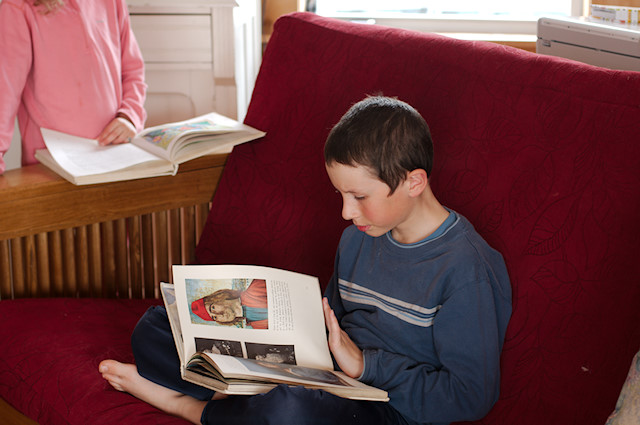
The Safety of Home
If Laurent went to school his dyslexia might have been picked up sooner. Or maybe not.
One thing I did notice in my reading is that schooled dyslexic children can struggle with self esteem issues from being different than their peers. Labeled incorrectly as disruptive or even hyperactive, segregated for special lessons, behind their peers in spite of other high intelligence, and even denied access to the type of learning they flourish at.
Most classrooms and government curriculums are not designed with these type of learners in mind. This is not a public school bash, just observations from my reading.
Interestingly, dyslexic learners within the school system are often labeled with behavior problems also. I think this is just because they are in an environment not conducive to their learning needs and they act out in boredom and frustration. Laurent does not have behavior issues, at all. He is the sweetest, most loving and compassionate kid. And he feels good about who he is and his unique talents and gifts. I shudder to think what the situation would be like if he was in school.
Again, I’m not school bashing. My heart simply aches for children who are mis-labeled as behavior problems, which leads to further learning problems, when the problem is not the child but the learning environment or un-learning environment they are forced into.
In our home, Laurent gets to be exactly who he is. In this safe environment he flourishes as an artist, a naturalist, a hands-on learner and non-sequential thinker. Ironically, the same brain wiring that enables Laurent to be such a gifted artist also makes it hard for him to read.
The challenge of course for me is that I need to help Laurent learn to read, in a way that works with his learning style, without being able to access school resources. (In some cases homeschoolers can access public school resources. That is not an option for our family.)
Learning About Dyslexia
Like I said in the introduction, this is not a how-to diagnose a dyslexic child, how to teach a dyslexic child or in any way a definitive resource on dyslexia. Determining Laurent has dyslexia felt a bit like falling the down the rabbit hole, disorientating and overwhelming. The blessing of the information age is also the curse. Too much information overwhelms me, especially about something so unknown and scary (for me) like a reading disability.
Because of my personality type and the way I handle information, I approach Laurent’s dyslexia on a “need to know basis”. I do not need to know everything there is to know about dyslexia. I only need as much information as will help Laurent, right now. My goal is not to be a dyslexia resource person, though I hope this post is helpful to someone out there. My goal is to help my son learn to read.
Bright Solutions for Dyslexia was my first real introduction to dyslexia. I used Susan Barton’s video instruction to diagnose Laurent’s dyslexia. (Her videos are excellent and quite comprehensive.) We have not had any formal testing done by an evaluator. Susan Barton also sells teaching and training materials. I have not purchased those.
Here are a few other resources I am familiar with. Most of these have been recommended to me by FIMBY readers who also have dyslexic learners in their home.
- International Dyslexia Association
- Dianne Craft
- Overcoming Dyslexia: A New and Complete Science-Based Program for Reading Problems at Any Level
Diagnosing Dyslexia
If you are wondering if your struggling reader has dyslexia you might look into Lexercise. I found out about this company this spring, after I had already diagnosed Laurent’s dyslexia.
Lexercise offers free testing for dyslexia and professional (not free) language therapy, regardless of where you live. Which would be good for a situation like ours where we have limited access to local language resources. We’re not pursuing this option currently as we’re using other resources and the Lexercise program is quite expensive, though on par I believe with most other language therapy.
The testing however is free and if you want to know how it works, read these great reviews by Maureen Spell and Kris Bales. Both these writers are homeschooling mothers, which is a perspective I appreciate.
Dealing with Dyslexia
When I found out Laurent was dyslexic, I had no idea what the best approach was for helping him learn to read. This was all new to me. Laurent’s dyslexia is mild to moderate. By last summer he was reading, but certainly not at grade level, and more importantly, not at a level he was happy with.
I’m a pragmatic mother and homeschooler. I believe in doing what works. I also believe in keeping things simple, wherever possible.
Some of the programs I looked at required a lot of teacher training and a hefty student/teacher time commitment to lessons. I wasn’t sold on this. In part because I know how we operate as a family and also because we were preparing to move, again, and I needed to be realistic about what I could give in terms of time.
iPod & Audio Books
Before I decided on any method of teaching Laurent we bought him an iPod and subscribed to Audible.com. The worst part of Laurent’s reading struggles, as far as he was concerned, was that he couldn’t read the books that were at his intelligence and interest level. We needed to address that frustration before anything else.
Once Laurent was able to access and listen to good books, the books his sister had been talking about for years, he became much less frustrated. A benefit to the iPod is all the other activities Laurent can do on there - playing chess, (and a weekly ration of Angry Birds!), taking photos, and writing notes. We also purchased and downloaded animal identification guide apps for the iPod. This is a highly visual tool that helps Laurent access information in a way that works for him.
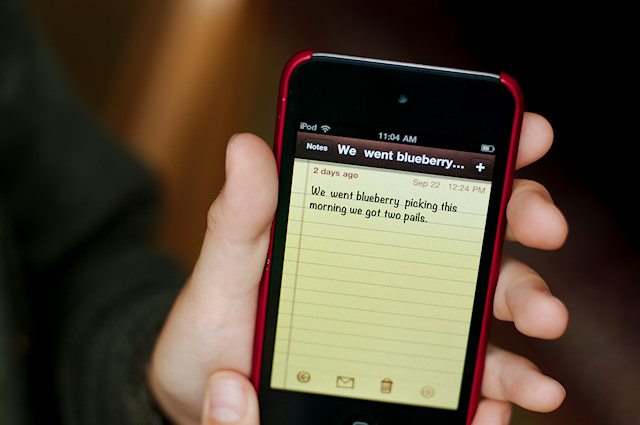
We always have listened to audio books and they are an important part of my happy homeschooler tool kit. Audio books are highly recommended for dyslexic learners. Beyond the usual finds at your local library (there are none at our library, hence the Audible subscription) there are free online resources for learners with reading disabilities. One of those is Bookshare. There are probably more. The caveat for these services is you need a certified diagnosis and they may only be available in the United States.
If you know of more audio book resources please add them to the comments.
Taking it Slow with Orton-Gillingham
Once Laurent’s immediate need for good stories was met I needed to find a teaching approach that would work for him. When you find out your child is dyslexic there is a natural desire to want to “fix it! now!” In that state of mind, well meaning parents can be tempted to spend a lot of money to solve the problem. In my fear (because discovering Laurent is dyslexic was a scary thing for me), I didn’t want to panic and buy an expensive program or some kind of intervention that was overkill for our needs.
The other tendency is to plan for laborious lessons. I am realistic about how I work as a homeschooler and long sit down lessons are torturous for me, never mind my kids. I needed to find the right fit for our family, not just Laurent.
I’ve proceeded fairly slowly and calmly in finding resources to help Laurent. I think it’s going to be this way for a while - slow and steady. From my understanding, dyslexia is not something you fix. So the trick is to find methods and set up a learning environment that works.
Orton-Gillingham is a teaching methodology that was recommended everywhere I looked. So that’s what I’ve looked for in teaching resources.
All About Spelling
I started with a spelling program. I honestly don’t remember the exact train of thought that made me choose this to start with but I think my reasoning had something to do with wanting to teach my girls some spelling skills at the same time.
All About Spelling appealed to me because it didn’t require any special training, is Orton Gillingham based, is not expensive (compared to other reading programs) and I could teach Brienne and Céline using the same program. And it came highly recommended by other homeschoolers.
Yes, it’s a spelling program but in teaching spelling it teaches how to read. There is an actual All About Reading program but I didn’t consider it because I wanted to focus on spelling for all my learners as well as reading basics for Laurent.
We like All About Spelling. I hadn’t intended to use a spelling program (I’d sworn off spelling instruction as a separate subject), as I think spelling can be taught with regular reading and everyday writing. But if your child struggles to read, well then you’re in a pickle with that method. But more about writing and spelling in a future post.
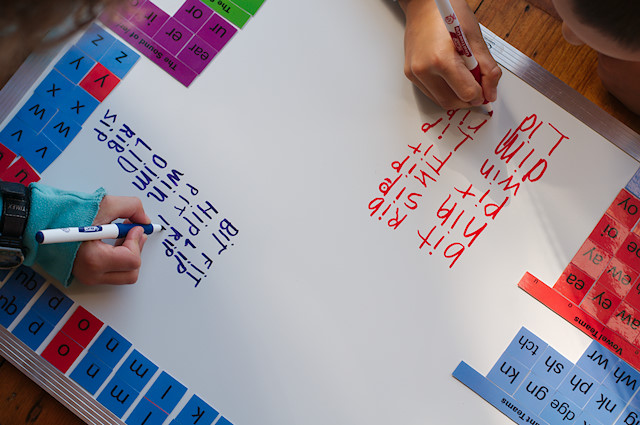
All About Spelling is easy to use, which is important to me. It’s not tedious, the kids weren’t bored and neither was I. Also important to me. We started with Level 1 and had great success and I finally learned all the sounds the vowels make! The kids learned that too, and more. I recommend it, though if you have good readers you probably don’t need it to teach spelling. I used it mainly for reading instruction. (I was pleased enough with All About Spelling to join as an affiliate.)
This might not have been the most logical place to start but it worked for us. I wanted to just start somewhere and experience success - which we did. Laurent’s reading started to improve. And we liked the program. It was the least painful spelling instruction we’d ever done. And it made so much sense. I was learning as much as the kids. Was Laurent’s improvement due to the program or from other brain developments? I don’t know and it doesn't matter to me. Laurent's reading improved.
This past winter, while working through All About Spelling I wondered where to go next. We were moving, again, so I had to put everything on hold, again. But I was looking and praying.
Reading Horizons
Then out of the blue, I got an e-mail. A request to review a reading program. I was very hesitant at first. All About Spelling was working for us and I didn’t want to potentially introduce a new teaching methodology and mess things up. Also, this request to review a product wasn’t just about me using a product and my writing a review. My child had to use the product and I don’t make my kids jump through hoops just so I can write a review for a company, even if I do get the product for free!
After researching the product, we agreed to try it. Laurent started Reading Horizons in June and we’re all pleased with his progress. I think it's a great reading program. That’s my next post, coming Monday. A complete review and giveaway, which I'm really excited to bring you. (Since becoming a happy customer I've also become an affiliate for Reading Horizons.)
Hi/Lo Books, Graphic Novels & Comics
Part of the struggle for a dyslexic reader is that their intelligence is high but reading ability low. Hi/Lo books are written for these type of readers (not just dyslexics but any person with lower reading levels such as second language learners). I bought some Hi/Lo books last summer and they’re not very popular around here. The language is necessarily simplified and I think the books are just not engaging enough for Laurent.
What has been a great hit though with my kids for years are graphic novels. Laurent has always gravitated to these books and now I can better understand why. The stories are complex and because the graphics tell the story, as much as the writing, you don’t necessarily have to read the words to follow along. Graphic novels were always a part of our weekly library haul when we lived in Maine. Interestingly, Québec libraries have tons of graphic novels because they are a big part of the French reading culture. Of course they’re all in French - which doesn’t help our English reading cause.
Our absolute favorite graphic novels are the Asterix and Tintin series. I bought some of the Graphic Resolve Series of graphic novels published by Stone Arch Books. These are classic books, written and illustrated for struggling readers (or any reader for that matter - all my kids like them). For a while we did these as reading practice. Then Laurent discovered Calvin & Hobbes.
Comics are similar to graphic novels but are much shorter stories. Usually just a few frames long. Of course struggling readers love comics for all the same reasons as graphic novels - the story is told in the pictures in both pictures and words. And comics are funny, which appeals to kids (and adults). We own a few Calvin & Hobbes books, classics in our home, and these were Laurent’s readers-of-choice for a time.
My goal is to have my son engaging with words, reading and comprehending; gaining competence and confidence. Comic books, graphic novels, and even video games - whatever works.
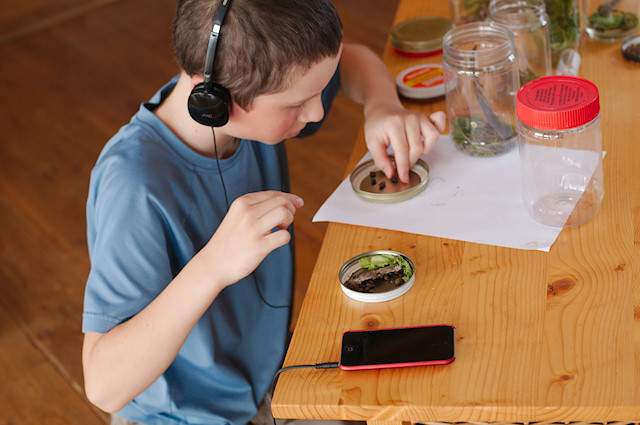
Video Games
Most recently our family, with the exception of me, have gotten into computer role playing games. These games involve a fair amount of reading (character dialogue, etc.) in addition to the usual audio story telling of the game. This style of reading really appeals to Laurent. It’s graphic (I’m not talking about violence, I’m mean artistically graphic - he can understand exactly what’s happening without all the words, it’s a video game after all) and the story is very interesting. Not to mention the whole family plays it and he’s a part of the action.
Brain Games
Another type of game we’ve used are “brain games” for lack of a better description. I purchased these from Dyslexia Games. I haven’t used these recently with all our moving around but they are great travel games or “I’m bored” activities. Both Brienne and Laurent like doing them.
Summary
This is where we’re at one year after finding out Laurent has dyslexia. Because we’re homeschoolers and there aren’t a lot of public resources available to us we’re figuring it out ourselves. And yet, it doesn’t feel like we’re figuring it out ourselves. When I reached the end of my understanding I've prayed for help and there have been answers. Answers in the form "out of the blue" e-mails or “stumbling” on the right resource or the right contact person.
We currenlty have a three pronged approach to helping Laurent:
- Access to stories. Until Laurent can read at his intelligence level he needs access to books in audio form.
- Reading instruction. We started with All About Spelling and now use Reading Horizons. I will be sharing more about this program in my next post.
- Reading practice. Using anything that interests Laurent. Laurent’s favorites are graphic novels, comic books, video games stories, and animal guide and reference books with lots of illustrations.
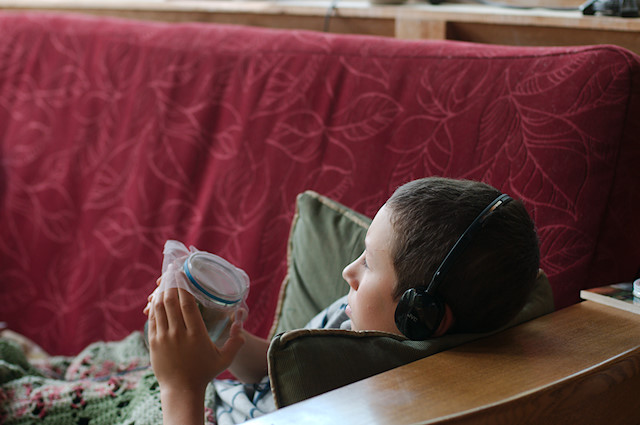
We do not think something is “wrong” with Laurent. His brain is wired a particular way that makes reading difficult for him. This is both unfortunate and fortunate. This “wiring” makes Laurent an amazingly gifted artist, not to mention his high emotional intelligence. You could say he’s got a strong right brain. I believe Laurent has a very bright future and it’s our job to help him acquire the skills, which includes reading, that he’ll need to get him where he wants to go.
To quote Dyslexia Games:
When we talk about the Dyslexic Brain we can say, "Oh no! Something is wrong with my child's brain!" But in fact nothing is wrong, just beautifully different. Dyslexics are known for being quite intelligent, exceptionally creative, and capable of adapting to challenging circumstances. Throughout history we discover that people with symptoms of Dyslexia have become some of the world's greatest artists, thinkers, inventors, and scientists. Their ability to think outside the box is a powerful tool that allows them to become exceptional individuals who have a habit of changing the world.
This is how we see Laurent, and all of our children - world changers with unique gifts and unique challenges.
As I type this I can hear Laurent reading out loud in other room. Reading on his own initiative, for his purposes and pleasure. It’s an animal book I believe (I hear the words gecko and armadillo), one of his favorite subjects. His voice, reading aloud, is music to my ears.
This post has affiliate links.
Filed Under
Resource Library
-

Mary-- The Yellow Door Paperie on Aug. 17, 2012, 7:15 p.m.
I was not diagnosed Dyslexic until I was a senior in high school. But I'd always been a lover of books and stories, I found ways to get around my reading problem (I had a twin in the same grade so we could discuss all of our assignments at length... grandma LOVED to read out loud, and she lived next door!). So we didn't realize it was a problem until Grandma moved two hours away and my school assignments be came too complex.
I am so glad that you are looking at this now and you are investing in his literary future. As an adult I've discovered audio books and I listen to hundreds of hours a year. I also read regularly and with a few tools and some understanding, I've flourished in that area.
You are doing some good and insightful work with him!
-

renee on Aug. 21, 2012, 12:21 p.m.
Mary, this is fascinating. Thank you for sharing your story. I would be curious about the tools you use, if you care to share.
-
-

Stephanie on Aug. 17, 2012, 9:36 p.m.
Please tell Laurent thank you for allowing you to tell his story, and thanks to you for telling it so thoroughly. I have wondered about my late reader, who makes progress but very, very slowly. He usually covers it up well by claiming to "hate" reading, although he loves books and adores being read to. As I've observed it seems something is blocking his way. I'll be checking out the links you provided and looking into these possibilities. Thank you so much!
-

kirsten on Aug. 17, 2012, 10:02 p.m.
Thanks for sharing this!
I am curious about how you approach the labelling issue in the home... do Laurent and his sisters know he is "dyslexic" and that therefore he will need to learn reading in a different way? Is it something that needed to be discussed as a family or more between you and your husband?
-

renee on Aug. 21, 2012, 12:31 p.m.
Absolutely. Once I determined that Laurent had dyslexia, and got over my fear about using that term (I still cringe at the words "diagnosis", "intervention" and other medical sounding terms - and I steer clear of resources that use this words a lot), we started using it freely in our home. And honestly, it's been a great relief. It gives a word to something we hadn't been able to understand, why reading was such a struggle for Laurent. We also freely talk about Laurent's brain being wired a certain way. In fact, all our brains being wired a certain way. Each of us show natural aptitude in certain areas and struggle in others, whether it's personality related or learning related (for lack of better terms). We try to capitalize on our unique strengths and figure out ways to gain competence in the areas we struggle. But mostly we focus on our positive attributes.
-
-

Jason Elsworth on Aug. 17, 2012, 10:25 p.m.
Very interesting post. I think you are finding just the right balance between, on the one hand helping him and on the other not making it a huge life defining issue. I will be looking at the spelling resource as my youngest (taking after me) finds it a challenge.
I taught my oldest boy (who has Down Syndrome) to read. But when I see him listening to James and The Giant Peach on audio book, whilst following along in a text book, it is all worth well. We are lucky that there are so many resources available to help us now.
Would love to see a similar big post on teaching creative writing please:).
-

Anonymous on Aug. 18, 2012, 2:26 a.m.
We use Sequential Spelling for our spelling program. Three of my four kids (ages 11, 11, 9) are using it. I give them the words and then we go over them. Meaning...I spell the word and they correct right then and there. At one point I was giving three spelling test etc. I ended up being too much work. My sister recommended this and it has worked nicely. At first I didn't "do" spelling with them, but my son was having difficulty reading and was horrible at spelling. After using this program for over a year thing have improved tremendously. This program was designed for Dyslexia. The official title is Sequential Spelling for homeschool. by Don McCabe AVKO Dyslexia & Spelling Research Foundation. The website listed www.avko.org. My sister gave this to me and she bought it online. I think through ebay, but I'm not sure. I think one book was $21. None of my kids have reading difficulties, so I can't say that it helps, I'm just throwing some more resources your way. Who knows when you may find something that might work. Maybe not now, but in the future.
You may also want to check out the book: Gut and Psychoclogy Syndrome by Natasha Campbell-McBride. This supposedly helps people with dyslexia. Once again I can't speak to as whether or not this helps, but just another possible resource.
Good Luck, it isn't alway easy homeschooling through learning difficulties, but when you find what clicks...there is such a sense of accomplishment for everyone involved.
-

renee on Aug. 21, 2012, 12:36 p.m.
Thanks for all the resource recommendations. It's interesting how reading struggles changes our perspectives about spelling. With my really strong reader I'm confident she can figure out the spelling, with a little help in the right direction, because she has so many years of reading to draw from. She recognizes if a word is spelled wrong, even though she hasn't had spelling lessons. Different story for my other children, which is why I started a spelling program with them.
-
-

Catherine Forest on Aug. 18, 2012, 2:42 a.m.
Very interesting and informative post, Renee. Laurent is so lucky to be home with you!
-

Marianna on Aug. 18, 2012, 2:44 a.m.
Wonderful post Renee. I especially love the quote from Dyslexia Games. We've talked before about dyslexia and the challenges it presents as children learn to read. Of course, our situation is a little different in that my son is in public school. I count it grace every day that his being in that environment has not had a detrimental effect on him, an experience that I realize is not typical. There isn't much to recommend about public education in the state of Texas with the exception of their mandating the identification of and accommodating dyslexia. Of course the worry never goes away. He is starting middle school (7th grade) next week which will present a whole new set of challenges for him, especially considering he's carrying a full pre-AP load. A long way from the kindergartner who couldn't remember the word "the" from one sentence to the next!
Like you I was very reluctant to put a label on my child...still am for that matter. I consider dyslexia to simply be a part of who my son is. "Label" also implies pathology which I'm not crazy about. Having said all that the label does help him navigate in school in that he is allowed accommodations that "put him on equal footing."
Reading Horizons looks like an amazing program. It's strong basis in phonics and emphasis on the orthography of language is perfect for the dyslexic.
Yes, yes, yes to audio books. My son loves books, always has, but I will admit that at thirteen he seldom reads an actual book as it is simply too tedious. He reads on/above grade level, but is and always will be a very slow reader. However, he listens to audio books every single day, often for hours at a time.
One other resource you might look into is apps for the iPod. There are a number of apps for spelling, reading etc. One of the best is American Wordspeller which allows the user to put in the phonetic spelling of a word and have the dictionary give them a list of words that correspond. This will be more important as he gets older and is engaging in deeper writing activities.
I love that Laurent agreed to let you tell his story. It's an important story to tell since 10-15% of the English speaking population is dyslexic, but a much smaller percentage has been identified. Identification is the key to understanding and Laurent's story could very possibly help in that. Thank you to you both.
-

renee on Aug. 21, 2012, 12:42 p.m.
Marianna, Thank you for your contribution to this discussion. I was hoping you'd weigh in! Thanks for that app idea - what a great resource! There is so much available now, I feel blessed that technology can be used in such positive ways. And I hear you about labels and pathology. I doesn't sit right with me, so I choose not to think of dyslexia as a pathology at all. And there are more resources out there now that also take this view, along the lines of that Dyslexia Games quote.
-
-

Mama on Aug. 18, 2012, 3:11 a.m.
Papa has mild dyslexia. Thankfully he was homeschooled until high school, which I believe gave him the time and one-on-one support he needed from his caring mom to help him learn to read. He gets along fine now, most people probably couldn't tell he still has to work not to mix up words on paper, but he reads every day and uses it to meet his needs. He has learned to work past his disability and is comfortable reading. I'm sure it takes great courage and patience on your part to support Laurent, he sure has an awesome mom! :)
-

Anonymous on Aug. 18, 2012, 4:49 a.m.
This is a journey for your whole family; however, I can tell that you and Laurent are equally lucky to have each other as you discover his strengths on the road to thoroughly enjoying reading. Your flexibility, commitment, and curiosity are commendable. A shout-out, too, to Laurent for sharing his story.
-

Anastasia @ eco-babyz on Aug. 18, 2012, 5:23 a.m.
Thanks for sharing... and wow, this is funny! A couple of weeks ago I also got on board with Reading Horizons, I got their phonics package to review and give away and I was looking for 3 homeschooling bloggers to team up with me for the giveaway. I was sitting there thinking "FIMBY homeschools, but I doubt Renee would want to run a giveaway, it's more of a 'life' blog, etc" lol I'm looking forward to reading your review! I am starting it with my almost 4 year old soon and I'll be writing the actual review later in the fall, but I'm realizing she is a little too young for reading. She knows letters and she is actually wanting to read, so she may be 'a Celine', it seems like it will be easy for her. We're going to try Reading Horizons but I'm not going to push her into it. If it seems like too much we would delay it a little, though I would still write the review on what I think about it. From what I know, it's perfect for struggling readers, so it'll probably be great for Laurent! I'm also an affiliate with them :)
-

Anne on Aug. 18, 2012, 7:51 a.m.
Hi Renee,
Thanks for sharing this story. My husband is dyslexic, and he dropped out of school around 15 because no-one picked up on it, and he was labelled as a trouble-maker. My ten-year-old son also loves audio books, and we've just discovered this fantastic website where you can download free audio books. They are recorded by volunteers, and they are free because they are all in the public domain, ie the copyright has expired. The web address is http://www.booksshouldbefree.com/
Anne (from England but currently living in France for three months!)
-

renee on Aug. 21, 2012, 12:49 p.m.
Anne, thank you for sharing this and pointing out this resource. Libravox is also a free public domain book service. The problem is that a lot of the books Laurent wants to listen to are not in the public domain! Celine reads a lot of public domain books on her Kindle also.
-
-

Nicole on Aug. 18, 2012, 1:59 p.m.
As a public school teacher, who thinks the entire system needs a HUGE overhaul, I agree that kids who learn to read differently or at a slower pace often end up with behavior problems or self-esteem issues. And I must say that it is NOT because the classroom teacher does this to the child, or means to do this to the child - it is a combination of being surrounded by peers who are progressing faster, and the way the school system is set up in that it puts learners into a mold saying that they should learn certain things at a certain rate by a certain age and there is no room for deviation. I assess where my students are, and go from there, and they all learn, they all leave knowing more than when they started, and it kills me that for some it just isn't "good enough" for what our system says is appropriate for that year.
It has always amazed me that when we take our babies to well-baby check-ups for those first 5 years there is quite a large range of normal for developing, rolling over, learning to walk, talk, etcetera, but as soon as a child hits school the system expects them to all learn the same exact things at the same exact time within a ten month period, and then be ready to move on. It makes no sense! The way the system currently stands, there's no taking into account family culture or background knowledge the student brings to the classroom.
Reading homeschooling Blogs over the last few years has helped me be a better public school teacher! You all have so much common sense compared to the powers-that-be that have created our school system in America (not sure about Canada's). Thank you for sharing your story - and thank you Laurent for letting Mom share - God will use it in many ways, I'm sure :)
-

renee on Aug. 21, 2012, 1:02 p.m.
Nicole, I have so much respect for classroom teachers. Having trained to be one, and worked a bit in the school system (part time) while going to school, and having done my student teaching in a middle school - I have some idea the amount of work, love and effort it is. Which is actually why I decided not to go that route. I just didn't think I could give what was necessary to be a great school teacher. The problem with the system is not teachers, from what I've seen, but all the bureaucracy. Most teachers I know want to do what's best for their students but their hands are tied by standardized test preparation and sheer student volume. The system does need an overhaul and I applaud you for doing what you can within that system. You're so right - why does everything change at age 5? Boom - you must progress at the same rate as everyone around you. It just doesn't make sense. Thank you for sharing your voice here. I really appreciate it.
-
-

kyndale on Aug. 18, 2012, 4:19 p.m.
Renee....We have so much in common. Solomon was diagnosed with dyslexia last year. We've also been on a journey of gigantic proportions! I've not written about it but it's very similar to Laurent's story. We've known something was brewing with Solomon for many years. He didn't speak really until he was two years old and when he was in the Montessori school he would hide under the desk when he was frustrated. It is Solomon who started our family on the homeschooling journey! I didn't want him to feel bad about himself or be stigmatized. He is also an intelligent, creative person. He just struggles with reading.
I do agree that parents shouldn't have to spend lots of money on programs for their dyslexic children. However, Solomon has been getting Brain Integration Therapy this summer and it's helped SO much!
Here's the link:
http://www.cherryriverwellness.com/
What I've learned is that nutrition plays a huge role in how any child learns. We've got to put good stuff in their bodies!
I've been reading over and over again your e-book. I love it! We tried the tahini dressing and it's the bomb! I'm going to the store today to pick up some other ingredients for your dressings.
Much love, Kyndale
-

renee on Aug. 21, 2012, 12:52 p.m.
Kyndale, Thank you for sharing this resource. I actually don't mind spending money to help Laurent but we only have so much available for that so I have to make the best use of what we've got. Nutrition is huge isn't it? Our diet is nowhere near perfect but I do wonder if Laurent would struggle even more if we ate the standard north american diet. I don't know. I like to this our high nutrient and plant diet helps. I need to read more about this though.
-

kyndale on Aug. 21, 2012, 3:07 p.m.
I know how much clearer my mind is when I eat right. I know it helps my son too. All the doctors that we've seen, which happen to work outside the box (alternative) talk about nutrition first and foremost!
-
-
-

kristen on Aug. 18, 2012, 5:03 p.m.
Thank you for sharing your story. I have to tell you that I have learned so much from being here. I too am on the same journey of trying to put the pieces of a puzzle together. My daughter was diagnosed a year ago with expressive/ receptive disorder. I don't completely agree with the diagnosis but I do recognize that she learns differently. I was told by a naturopath to eliminate dairy from her diet. Is anyone else out there familiar with this disorder?
-

renee on Aug. 18, 2012, 5:16 p.m.
Kirsten, I'm not sure about that diagnosis. I'm not familiar with various disorders, but I think elminating dairy from anyone's diet is helpful. I'm super biased in this regard but there is just so much evidence against dairy in relation to gut health and therefore body health. You might try eliminating gluten also. I have considered going gluten free again with the kids (we eat small amounts of gluten, Damien is pretty much g-free in his diet) to see if that has any noticeable affect on Laurent's learning. It might be hard to tell but it doesn't hurt. Gluten is implicated in so many things, going g-free never hurts (though it's tricky at first to remove from your diet). Diet is really important in overall body health and wellness - including brain function and learning. I didn't mention it in this post because it was too long already but this is the next piece of the puzzle for me. Our diet is really good, by most standards, but there is always room for improvement.
-
-

Jennifer on Aug. 19, 2012, 5:34 a.m.
Thank you so much for this beautiful post, Renee. And thank you to Laurent for letting his story be told. I really appreciate your approach to this journey you are on, and he is lucky to have you as a mom and as someone to be his advocate. My first child went to public school through first grade, so he learned the basics of reading and then it clicked over that summer and into second grade, when we started our alternative/hybrid homeschool program. Then he zoomed ahead and is now reading at almost adult level (though spelling is another story, and I'm not sure about comprehension, but I don't worry about him in the least). My daughter, however, has had a more difficult time. When we started working very gently with her last year (kindergarten) on her reading, she became increasingly frustrated. She asked for glasses, started squinting, and covering one eye to read, and complained the words were blurry. After having her eyes checked out, we found out the clarity of each eye was fine, but she was having problems with how each eye saw things and her brain worked together. It's too much to get into here, but she needed vision therapy to fix it. Needless to say, she doesn't enjoy reading, though she loves being read to, and is super smart. She has a great imagination. It is so painful as a mom who loves books and writing, and the rest of our family are bookworms - my mom is even a librarian! It's tough to see your child struggle with reading, when you know how it unlocks the world for us and is so necessary for success in life. My daughter is doing much better after only a few months of therapy, (I was skeptical, but did some research and thought we'd try it) and I am hopeful for her, but I do think her setbacks have affected her attitude about reading books. I think many of the things you've suggested for Laurent might work for us, too. I'm going to look into some of them. Thank you again for sharing. It means a lot to me.
-

Josh on Aug. 19, 2012, 4:06 p.m.
Loved your article, ii have homeschooled my daughter with dyslexia (in THE Netherlands). We loved this: http://www.dyslexia.com/. We read the book and did some of the exercises. She is 10 and a good reader, slow but thorough, and getting there with writing, and very creative.
-

Barbara Tougas on Aug. 20, 2012, 2:18 a.m.
When I was teacher aide for a dyslexic adult student, we found using a strip of white cardboard held under the sentence he was reading helped a great deal. It blocked out the print below because his eyes tended to jump around the page. It helped him to focus and stay on the line he was reading.
-

Heather on Aug. 20, 2012, 1:12 p.m.
Great post...I've noticed with the dyslexic/learning disability children I've met that they tend to be very creative/artistic, have you looked at a waldorf approach to schooling? It has art incorporated into every subject. Also, there's a book "optimum nutrition for the mind" that lists some supplements that can help with dyslexia, as sometimes it can be caused by or exasperated by a nutritional deficiency.
-

renee on Aug. 20, 2012, 1:17 p.m.
We don't follow any particular educational philosophy but we have a natural waldorf bent because of our love for nature/outdoors and creative/artistic inclinations. Laurent naturally incorporates art and hands-on learning into almost everything he does. Thanks for the book recommendation. This is the next step for me - look over our diet for possible deficiencies. One step at a time.
-
-

Heather Caliri on Aug. 20, 2012, 7:55 p.m.
I like both the realism of this post (homeschooling doesn't always go according to plan) and your refusal to let fear make your parenting decisions for you. When everything is going swimmingly, it's easy to parent fearlessly. Less so when you hit a roadblock and your expectations are shattered. Thanks for your honesty.
-

Amiee on Aug. 21, 2012, 4:42 a.m.
Thank you so much for sharing your story. It felt a like a hug as I the read love and understanding in each word you shared.
I am dyslexic but did not figure that out until I was almost 30. I'm 36. My parents are dyslexic and so is my brother. School...well I hated it. In all honesty it felt like my true education started the day I graduated from high school. It marked the moment that I was truly free to learn as I wanted and that is when I blossomed. Thankfully life is a great teacher...life and the internet that is. :)
A book that I found empowering to read is "The Dyslexic Advantage". It was the first time that I read about what I already knew in my heart to be true. That I'm not dumb. My nervous system is organized to work in a different way and with that there are numerous advantages and disadvantages just like with a "normal" nervous system. (I hate the word "normal" but alas my mind is drawing a blank, I hope you get my drift) For years I fought the diagnosis because I didn't like the "disability" that is associated with dyslexia, but now that I see all of the possibilities the label doesn't bother me quite so much.
I will confess that there are moments that I wish I could to go back to school simply to shout "I'M NOT STUPID, I'M DYSLEXIC!!!" and perhaps to slap a few teachers and give a big bear hug to others. For now I settle for the pure joy and satisfaction I get every time I finish another book, or write a blog comment. :) I LOVE to read! I would love to LOVE writing too, but I'm not there quite yet. To that I say "Hooray for hard things!" A life of learning -in ALL it's forms- is a beautiful thing.
-

renee on Aug. 21, 2012, 1:03 p.m.
Amiee, Thank you for sharing your experience here. That sounds like a good book.
-
-

hayesatlbch on Aug. 24, 2012, 3:12 a.m.
You might find some useful links from my varied collection of free dyslexia help links page at dyslexiaglasses.com/links .
-

Ginny on Sept. 5, 2012, 10 p.m.
Thanks so much for the time you put into this post, Renee. I am almost positive that my son Gabe is dyslexic, and on top of that American English is his third language. We've been struggling with reading for over three years now. I recently started using All About Spelling with him too, and I think it is going to really help him both with reading and learning the sounds of the English language. I am going to check out Reading Horizons on your recommendation. Maybe some Tintin books as well :)
-

Kristin on Sept. 16, 2012, 1:53 p.m.
Great post, thank you so much! My oldest (16) is dyslexic and the first ten years of homeschooling was full of trial and error. Like you I felt in time things would work themselves out. What does work is repetition, repetition, repetition..... and patience. I also bought her an iPod and then an iPhone. The auto correct helps her spelling (yes, even texting!!). And gives her an opportunity to see correct spelling in everyday context. We have been using All About Spelling for the last year & it has been a great help. Also if you search iTunes for USF (iTunes U) you will find several classic books free, like Tom Sawyer & Sherlock Holms. :)
-

Liz on Sept. 17, 2012, 12:45 a.m.
My child loves audio books, Calvin and Hobbes, and stories in general. She also has a difficult time with reading. I was afraid that if I allowed her to be inundated with audio books then she'll never want to learn how to read. She is 9yo. But you are saying audio books are good. Are they good once the child shows an interest in learning how to read or even before? Thanks, liz
-

renee on Sept. 22, 2012, 9:01 p.m.
My feeling is that you put the tools and resources into your child's hands whenever they need and are ready for them. We have listened to audio books for years and I think they are a very good resource for kids and families. They have been a lifesaver for Laurent. Celine, our strong reader, listens with the family, but not her own. Brienne, who is neither a struggling or particularly avid reader likes audio books but also reading stories on her own. Her reading is at a lower level than her listening but that's ok. She wants to listen to good stories and who can blame her. I wholeheartedly endorse audio books. Nor do I withhold them from my children in hopes that will motivate them to read more on their own. It would simply frustrate my dyslexic son and my younger daughter would miss out on some good stories that I don't have the time to read aloud to her (she's currently loving Anne of Green Gables). I think it's good to use audio books whenever you feel your family wants to. They are a great tool for keeping a quiet time when children are young and transitioning out of afternoon naps. Then as kids grow audio books can be wonderful ways to listen and learn about so many more things than you have time to read aloud to your children. I also love listening with my kids. For the past week we have all been engrossed in Eldest, listening in the car and while I cook meals. I love audio books! Audio books feature very prominently in our home and have since my children were quite little (I'm thinking four or five).
-
-

Angela on Sept. 19, 2012, 7:46 p.m.
I credit Calvin & Hobbes and audio books with motivating my daughter to want to read. She simply didn't think she wanted to read herself, that was why Mom and Dad were available. But when I began refusing to read Calvin & Hobbes as a bedtime story, she decided maybe reading herself would be a good thing. Now she is reading anything and everything, but she really loves graphic novels.
-

Sarah on Dec. 10, 2012, 1:58 a.m.
Thank you, Renee and Laurent, for sharing this. Dyslexia,like all learning differences, is often misunderstood and stigmatized, so, hopefully, as more people talk about it, there will be more acceptance of diverse learning styles. I just wanted to comment to say how much I loved your discussion of "labeling". It is so important to see children as individuals with diverse needs and learning styles... and yet it can be an incredible relief to find support, resources, and a description for what you feel when you get a diagnosis. I know this because I have dyslexia (slow visual and auditory processing) and AD/HD inattentive type. The beauracracy (spelling?) surrounding the diagnosis of learning "disorders" is unfortunate (for example, I cannot get the resources I need just from being diagnosed with dyslexia--a reading disorder--because it is not in the DSM 4) but knowing how much having a "label" has enabled me to educate myself has softened me to this idea of "labeling". On another note, part of the reason, perhaps (although I truly believe that the situational frustration of having dyslexia can cause "behavior"), for the association between dyslexia and behavior is that many dyslexics also have AD/HD, which (sometimes, not always) can make it more difficult for children to regulate behavior (also called "impulsivity") and to sequence (understand cause and effect). Just some thoughts... thank you for sharing!!
-

Katie McCUstion on Jan. 12, 2014, 7:04 p.m.
As a parent who is about a year in this journey with my seven year old son, we are in public school. I pray the opportunity for homeschool becomes something we can do as I still work full time . I could not of phrased it any better about being not against the school just that this type of learner does learn better in a one on one atmosphere and you nailed what would happen in the classroom. I will say good job on all of the resources and curriculum you have researched and are using as they are all the best and considered what should be used. My son is in therapy and this is what they suggested as well. Thank you for speaking out and I absolutely love what you said about Laurent in description of him. It was like hearing someone describe my child to a tee. You are a wonderful mom and you rock!!!
Warm Regards,
Katie McCustion
-

Kara on May 29, 2014, 12:45 a.m.
Did you discontinue All About Spelling when you started Reading Horizons? Do you think they could be utilized together?
-

renee on June 1, 2014, 8:28 p.m.
I did discontinue using All About Spelling simply for instructional time purposes. I just didn't have time to do both. But I do think they could be used together. I like both of them.
-
-

Cindy Belcher on June 18, 2016, 11:30 p.m.
I'm so thankful to you and Laurent for sharing your story. I needed to read this today!
You can subscribe to comments on this article using this form.
If you have already commented on this article, you do not need to do this, as you were automatically subscribed.
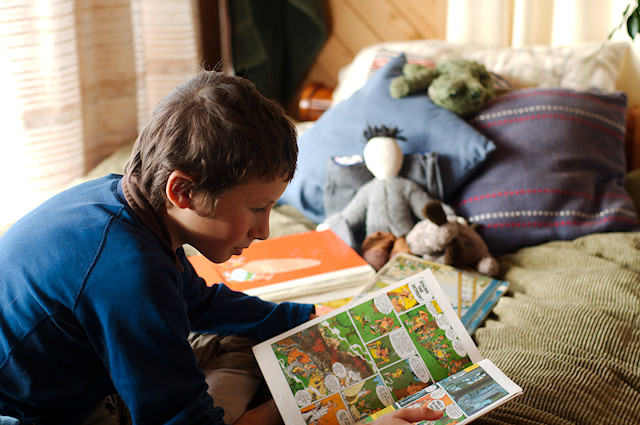






Amy on Aug. 17, 2012, 7:04 p.m.
Beautiful post, thanks for sharing. (And I LOVE Calvin & Hobbes!)